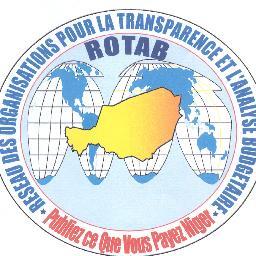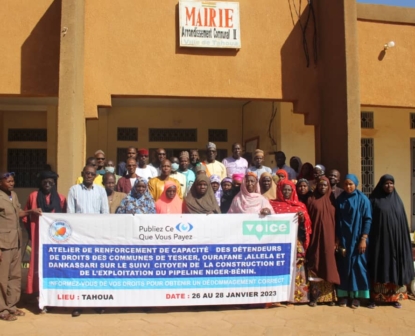Project
Supporting the population affected by the pipeline
-
Amount Funded
42,248 EUROProject Duration
01 Jan 2021 - 30 Jun 2021 -
-
Partners
Publiez Ce Que Vous Payez Niger
-
The network organisation Réseau des Organisations pour la Transparence et Analyse Budgétaire (Network of Organisations for Transparency and Budget Analysis) – ROTAB Publiez Ce Que Vous Payez Niger is a development collective consisting of a broad range of associations, NGO’s and associations within Nigerien civil society that in September 2006 decided to share their experiences and to join forces in a campaign “Publish what you pay for” to promote the transparency in the spending of revenues of the extractive industries sector in Niger. Notwithstanding, the last 40 years of mining and drilling activities, there is no openness whatsoever on the economic gains nor the investments by the government and the private sector in this vital part of the economy. One thing remains clear, the profits of this sector have not benefitted the Nigerien population.
The ROTAB network decided to concentrate on the analysis of the national budget to mobilise Nigerien citizens to stand up against corruption and to insist on transparency in regards to the income of the Nigerien government from foreign mining and oil companies.
To reach its objectives ROTAB employs the following strategies: political lobby and pressure; training and education; denouncements and public manifestations, meetings and picketing. The network coordinates all the activities of the campaign and is also responsible for the capacity building of its member organisations.
-
Organisation
The network organisation Réseau des Organisations pour la Transparence et Analyse Budgétaire (Network of Organisations for Transparency and Budget Analysis) – ROTAB Publiez Ce Que Vous Payez Niger is a development collective consisting of a broad range of associations, NGO’s and associations within Nigerien civil society that in September 2006 decided to share their experiences and to join forces in a campaign “Publish what you pay for” to promote the transparency in the spending of revenues of the extractive industries sector in Niger. Notwithstanding, the last 40 years of mining and drilling activities, there is no openness whatsoever on the economic gains nor the investments by the government and the private sector in this vital part of the economy. One thing remains clear, the profits of this sector have not benefitted the Nigerien population.
The ROTAB network decided to concentrate on the analysis of the national budget to mobilise Nigerien citizens to stand up against corruption and to insist on transparency in regards to the income of the Nigerien government from foreign mining and oil companies.
To reach its objectives ROTAB employs the following strategies: political lobby and pressure; training and education; denouncements and public manifestations, meetings and picketing. The network coordinates all the activities of the campaign and is also responsible for the capacity building of its member organisations.
-
Project
This project Supporting the population affected by the pipeline, supports the local populations affected by the crossing of the pipeline Niger-Benin over a distance of 150km. The project maps the impacts associated with the installation of the pipeline by informing and raising awareness within the pipeline’s neighbouring population to help them better understand these impacts and their behaviour to be observed. It will be executed for 6 months as a pilot phase.
Also, beyond information and awareness-raising, vigilance and monitoring committees composed mainly of young people and women are set up in the communities and a joint synergy by all affected communities created during implementation.
This pilot project works with a limited number of local authorities affected by the Niger-Benin pipeline.
- For the Zinder region, Tesker is affected by the pipeline for about 212 km;
- Tahoua, the municipality of Allela is crossed by the pipeline for 51 km
- The Maradi region, Ourafane, is also affected by the pipeline for 60 km;
- Lastly, Dan Kassari in Dosso region the pipeline crosses for 59 km.
The choice of municipalities was made based on the longest crossing area in each region.
-
-
This project Supporting the population affected by the pipeline, supports the local populations affected by the crossing of the pipeline Niger-Benin over a distance of 150km. The project maps the impacts associated with the installation of the pipeline by informing and raising awareness within the pipeline’s neighbouring population to help them better understand these impacts and their behaviour to be observed. It will be executed for 6 months as a pilot phase.
Also, beyond information and awareness-raising, vigilance and monitoring committees composed mainly of young people and women are set up in the communities and a joint synergy by all affected communities created during implementation.
This pilot project works with a limited number of local authorities affected by the Niger-Benin pipeline.
- For the Zinder region, Tesker is affected by the pipeline for about 212 km;
- Tahoua, the municipality of Allela is crossed by the pipeline for 51 km
- The Maradi region, Ourafane, is also affected by the pipeline for 60 km;
- Lastly, Dan Kassari in Dosso region the pipeline crosses for 59 km.
The choice of municipalities was made based on the longest crossing area in each region.
- News




